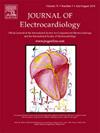FlexPoints:用于机器学习的高效心电图信号压缩。
IF 1.2
4区 医学
Q3 CARDIAC & CARDIOVASCULAR SYSTEMS
引用次数: 0
摘要
心电图(ECG)是最常用的医疗检测项目之一,在准确诊断和治疗病人方面发挥着至关重要的作用。虽然心电图设备会产生大量数据,但其中只有一小部分包含有价值的医疗信息。为了解决这个问题,多年来人们开发了许多压缩算法和滤波器。然而,新机器学习技术的快速发展带来了新的挑战。为了解决这类问题,我们引入了 FlexPoints 算法。这种创新算法会搜索心电信号上的特征点,并忽略所有其他缺乏相关医疗信息的点。实验证明,我们提出的算法可以显著减少代表心电信号的数据点数量,同时不会丢失有价值的医学信息。这些稀疏但重要的特征点被称为柔性点,可作为现代机器学习模型的拟合输入。与原始数据或由其他流行算法压缩的数据相比,当使用柔性点作为输入时,这些模型表现出更高的性能。本文章由计算机程序翻译,如有差异,请以英文原文为准。
FlexPoints: Efficient electrocardiogram signal compression for machine learning
The electrocardiogram (ECG) stands out as one of the most frequently used medical tests, playing a crucial role in the accurate diagnosis and treatment of patients. While ECG devices generate a huge amount of data, only a fraction of it holds valuable medical information. To deal with this problem, many compression algorithms and filters have been developed over the years. However, the rapid development of new machine-learning techniques introduces new challenges. To address this class of problems, we have introduced a FlexPoints algorithm. This innovative algorithm searches for characteristic points on the ECG signal and ignores all other points that lack pertinent medical information. The conducted experiments have demonstrated that our proposed algorithm can significantly reduce the number of data points representing ECG signals without losing valuable medical insights. These sparse but essential characteristic points, referred to as flex points, serve as well-fitted input for modern machine learning models. Such models exhibit enhanced performance when using flex points as input, as opposed to raw data or data compressed by other popular algorithms.
求助全文
通过发布文献求助,成功后即可免费获取论文全文。
去求助
来源期刊

Journal of electrocardiology
医学-心血管系统
CiteScore
2.70
自引率
7.70%
发文量
152
审稿时长
38 days
期刊介绍:
The Journal of Electrocardiology is devoted exclusively to clinical and experimental studies of the electrical activities of the heart. It seeks to contribute significantly to the accuracy of diagnosis and prognosis and the effective treatment, prevention, or delay of heart disease. Editorial contents include electrocardiography, vectorcardiography, arrhythmias, membrane action potential, cardiac pacing, monitoring defibrillation, instrumentation, drug effects, and computer applications.
 求助内容:
求助内容: 应助结果提醒方式:
应助结果提醒方式:


